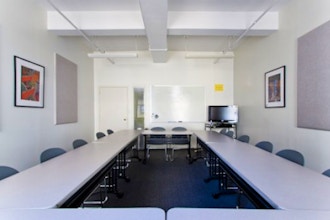This course gives you a firm grounding in the basics of humor writing craft and gets you writing a short piece (or two) or a book.
Course components:
- Lectures
- Writing exercises
- Workshopping of student projects (each student presenting work two times)
Humor Writing is for beginners or anyone who wants to brush up on the fundamentals. Students must be 18 years or older.
Course Syllabus:
Introduction to Humor Writing:
The secret formula to all humor . Exploration of various forms of prose humor writing—fiction, nonfiction, and in-between. Where to find humorous ideas. The elusiveness of humor.
Principles of Humor:
Exploration of the various techniques for achieving humor—exaggeration, juxtaposition, shock/surprise, extreme situations, sound/rhythm/wordplay, irony, attitude, absurdity. The various types of humor.
People:
Finding the stupidity in people. Round and flat characters. Showing vs. Telling. Methods for showing characters. Ridiculing groups of people.
Structure:
The basic structural techniques for humor—the rule of three, snowballing. Finding a major dramatic question. Shaping a beginning, middle, and end. Breaking the structural norms.
Point of View/Voice:
Point of view defined. Exploration of the various types of point of view. Voice defined. Exploration of the various types of voice. Tips for finding your voice.
Description:
Using the senses. Specificity. Techniques for creativity. Finding the right words. Merging description with point of view. Describing funny situations. Bad (but funny) descriptions.
Dialogue:
The importance of scene. Dialogue's illusion of reality. Quotation marks and tags. Stage directions. Summarized dialogue. Characterization through dialogue. Miscommunication. Not forcing it.
Point and Pointlessness:
Using humor to make a point. Using humor in pointless (but funny) ways.
Precision:
Hacking through the early stages. Zeroing in on the perfect words and achieving economy. Strengthening the humor techniques. Finding the peaks and valleys. Testing out the humor.
The Business:
Proper format for manuscripts. How to target publishing houses, magazines, newspapers, and agents. How to send your work out. Query letters.
Note: Content may vary among individual classes.
Important:
- Schedule posted is the Start and End date of the class. You may access the class at any time, day or night, within the schedule provided. Please see Online Class Delivery for more details.
- Registrants will receive email instructions and information on how to access the online classroom.
This course is available for "remote" learning and will be available to anyone with access to an internet device with a microphone (this includes most models of computers, tablets). Classes will take place with a "Live" instructor at the date/times listed below.
Upon registration, the instructor will send along additional information about how to log-on and participate in the class.



 CourseHorse Gift Card
CourseHorse Gift Card










